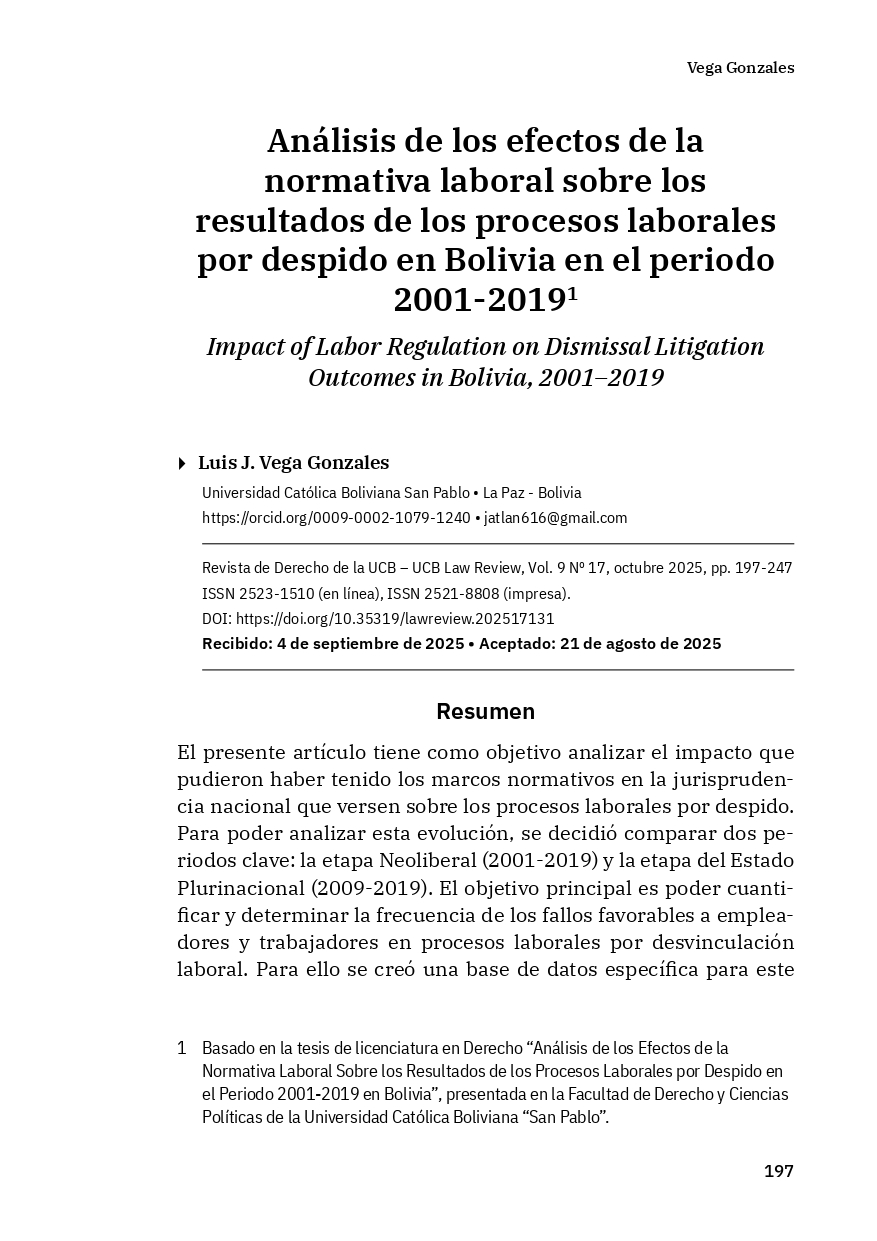Impact of Labor Regulation on Dismissal Litigation Outcomes in Bolivia, 2001–2019
DOI:
https://doi.org/10.35319/lawreview.202517131Keywords:
Bolivia, labor justice, legal frameworks, neoliberal stage, Plurinational State, labor protection, Supreme RulingsAbstract
This article aims to analyze the impact that legal frameworks may have had on national case law regarding labor dismissal proceed- ings. To examine this evolution, two key periods were compared: the Neoliberal Stage (2001–2019) and the Plurinational State Stage (2009–2019). The main objective is to quantify and determine the frequency of rulings in favor of employers and workers in labor dismissal proceedings. For this purpose, a specific database was created for this study, which includes all decisions issued by the Supreme Court of Justice between 2001 and 2019 concerning labor dismissal cases. The results indicate that most Supreme Rulings favor the worker in both periods; however, the findings show an increase in the number of rulings favorable to the worker during the Plurinational State Stage, which could be the result of more worker-friendly labor regulations in that period. This study contributes to the understanding of labor justice in Bolivia, offering an analysis of how regulatory changes in the country may influence judicial decisions. Furthermore, the findings have implications for public policy, as well as for opening new avenues of research and debate regarding fairness in labor relations.
Downloads
References
Andrade, O. W. G. (2010). Sobre La Economía Mixta (una Aproximación a La Economía Plural De Bolivia). Perspectivas, 25, 85-122.
Añez Hernández, C. (2004). El estado del bienestar social y el neoliberalismo ante los derechos laborales. Revista de ciencias sociales, 10(1), 70-82.
Cabrera García, G. C. (2012). Estadística paso a paso (1a ed.). Latinas Editores S.A.
Criales, F., & Torrico, G. (2022). Diseño Metodológico en Investigaciones Sociales: Métodos, Técnicas y Herramientas (2.a ed.). Instituo de Investigaciones en Ciencia Política.
Dick, M. (2020). Legislación laboral boliviana: Referenciada, actualizada, concordada, comentada y con jurisprudencia (7.a ed.). Librería Jurídica “Omeba.”
El país. (2023, diciembre 20). Un 85% de los ocupados en Bolivia forma parte del sector informal. El País Tarija. https://elpais.bo/tarija/20231220_un-85-de-los-ocupados-en-bolivia-forma-parte-del-sector-informal.html
Enriquez Velasco, J. C. (2007). “Efectos y consecuencias del decreto supremo No. 28699 del 1 de mayo de 2006. En las empresas del sector público y privado en la ciudad de La Paz” [Thesis]. https://repositorio.umsa.bo/xmlui/handle/123456789/38010
Ferrufino, R., & Muriel, B. (2022, junio 1). Ampliación de la Normativa Laboral en Bolivia (1999-2013): Resultados sobre el Empleo Digno. https://www.inesad.edu.bo/bibliotecae/ampliacion-de-la-normativa-laboral-en-bolivia-1999-2013-resultados-sobre-el-empleo-digno/
Hernández, J. G. V. (2011). Liberalismo, Neoliberalismo, Postneoliberalismo. Revista MAD, 17, 66-89. https://doi.org/10.5354/0719-0527.2007.13938
Jiménez, W. G., & Quintana, O. M. (2021). El uso de técnicas cuantitativas en la investigación del Derecho y las Ciencias Sociales. Inciso, 23(1), e1108-e1108. https://doi.org/10.18634/incj.23v.1i.1108
Morales, J. (1994). Ajuste macroeconómico y reformas estructurales en Bolivia, 1985—1994. Instituo de Investigaciones Socio-Económicas. https://iisec.ucb.edu.bo/publicacion/ajuste-macroeconomico-y-reformas-estructurales-en-bolivia-1985-1994
Morrison, K. (2010). Marx, Durkheim, Weber: Las bases del pensamiento social moderno. Editorial Popular.
Novoa, C. A. B. (2017). Investigación cuantitativa. Fundación Universitaria del Área Andina. https://digitk.areandina.edu.co/server/api/core/bitstreams/30b26254-a8d2-4cd6-b44f-e107d90d3e6f/content
Olmos, M. (1974). Compendio de Derecho del Trabajo (1.a ed.). Serrano.
Orias Arredondo, R. (2015). Reforma judicial en Bolivia: Elementos para el diagnóstico y desafíos (Primera edición). Friedrich Ebert Stiftung-- Bolivia (FES).
Paz Alvarez, M. A., Arciniega Terrazas, ela A., & Martínez Bahena, tina S. (2021). De la Nueva Política Económica al Modelo Económico Social Comunitario Productivo, el caso de Bolivia: 1985-2019. Tiempo Económico, XVI(48), 61-80.
Rodríguez Mancini, J. (2004). Curso de derecho del trabajo y de la seguridad social. Ed. Astrea.
Rodríguez Mancini, J. (Ed.). (2010). Extinción de la relación laboral. En Derecho del trabajo: Análisis doctrinal, normativo y jurisprudencial (1a ed., pp. 391-478). Editorial Astrea de Alfredo y Ricardo Depalma.
Secaira, C., & Valeria, D. (2020). La falta de tipificación de la renuncia y la estabilidad laboral [bachelorThesis, Universidad Regional Autónoma de los Andes]. https://dspace.uniandes.edu.ec/handle/123456789/12412
Tórrez Valdivia, R. (2012). Estadística descriptiva e inferencia estadística aplicada a la Ciencia Politica. Universidad Mayor de San Andrés. Facultad de Derecho y Ciencias Políticas. Carrera de Ciencia Política y Gestión Pública. Instituto de Investigaciones en Ciencia Política. https://repositorio.umsa.bo/xmlui/handle/123456789/9395
Constitución Política del Estado Plurinacional de Bolivia [Const]. Art. 309. 07 de febrero de 2009 (Bolivia). http://www.gacetaoficialdebolivia.gob.bo/app/webroot/archivos/CONSTITUCION.pdf
Constitución Política de 1967 [Const]. Art. 156. 02 de febrero de 1967 (Bolivia). https://www.lexivox.org/norms/BO-CPE-19670202.html
Código Procesal del Trabajo, Art. 3 (1979) https://www.lexivox.org/norms/BO-COD-DL16896.xhtml
Decreto Supremo 21060, Art. 55, ed. 1430-1431 (1985). http://www.gacetaoficialdebolivia.gob.bo/normas/buscar/21060
Decreto Supremo 28699. Disposición Reglamentaria a la ley General del Trabajo, Art. 14; 46, ed. 2882 (2006) http://www.gacetaoficialdebolivia.gob.bo/normas/buscar/28699
Decreto Supremo 1592. Art. 1 (1949) https://bolivia.infoleyes.com/norma/745/decreto-supremo-1592
Ley General del trabajo. Art. 13 (1942) https://bolivia.vlex.com/vid/ley-general-trabajo-685538933?from_fbt=1&forw=go&fbt=webapp_preview&addon_version=6.9

Downloads
Published
How to Cite
Issue
Section
License
Copyright (c) 2025 UCB Law Review

This work is licensed under a Creative Commons Attribution-NonCommercial-ShareAlike 4.0 International License.
The U.C.B. Law Review is an Open Access Journal, therefore, it is full free for access, reading, search, dowload, distribution and lawfull reuse in any medium only for non-comercial purposes, provided the original work is properly cited.








